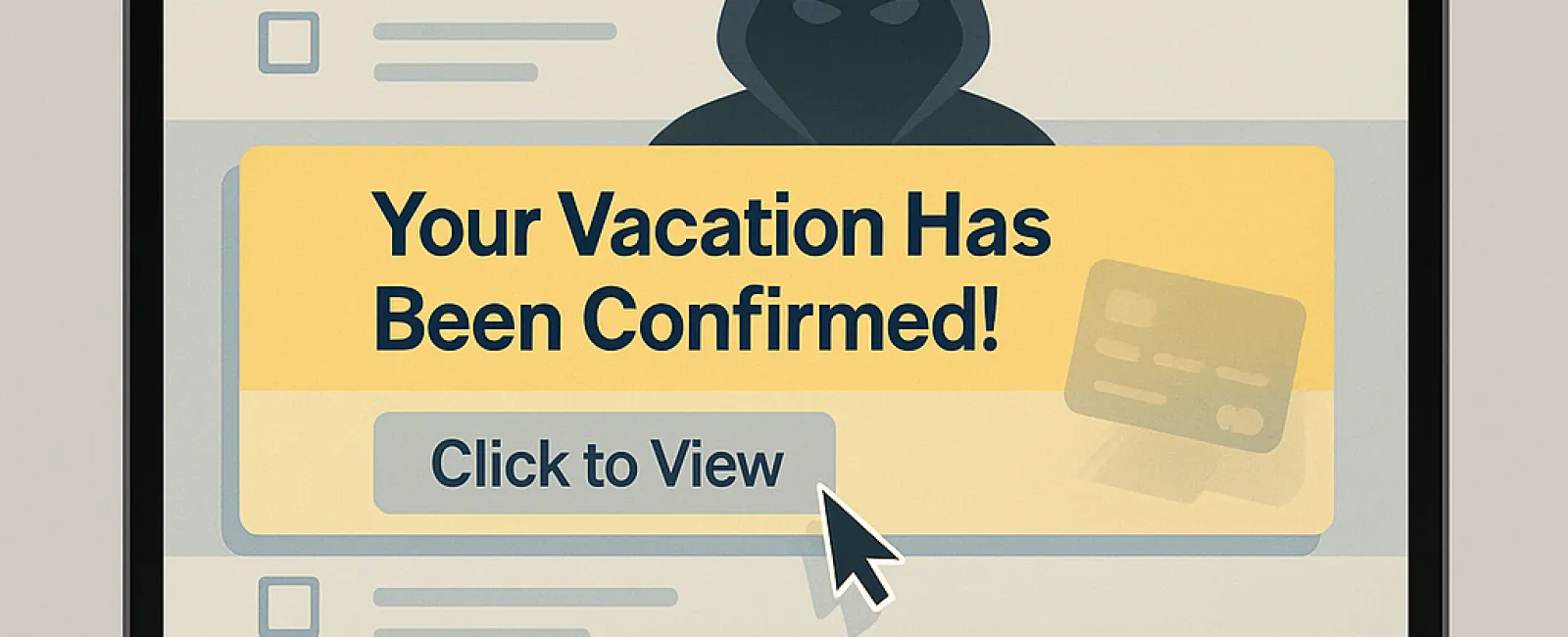May 12, 2025
Planning a vacation this year? Make sure your confirmation email is legitimate before you click anything!
Summer is approaching, and cybercriminals are taking advantage of travel season by sending fake booking confirmations that closely resemble emails from airlines, hotels, and travel agencies. These scams aim to steal personal and financial information, take over your online accounts, and even infect your device with malware.
Even experienced travelers are being tricked.
Here's How The Scam Works
A Fake Booking Confirmation Arrives In Your Inbox
- The email may appear to come from well-known travel companies like Expedia, Delta, or Marriott.
- Hackers often use official logos, proper formatting, and even fake customer support numbers.
- Subject lines are designed to create urgency, such as:
- "Your Trip To Miami Has Been Confirmed! Click Here For Details"
- "Your Flight Itinerary Has Changed - Click Here For Updates"
- "Action Required: Confirm Your Hotel Stay"
- "Final Step: Complete Your Rental Car Reservation"
You Click The Link And Are Taken To A Fake Website
- The email urges you to log in to confirm details, update payment information, or download your itinerary.
- Clicking the link leads to a convincing but fraudulent website that captures your login details.
Hackers Steal Your Information And/Or Money
- Entering your login credentials gives hackers access to your airline, hotel, or financial accounts.
- Providing payment information allows them to steal credit card details or make unauthorized transactions.
- If the link contains malware, your device and data could be compromised.
Why This Scam Works So Well
- It Looks Authentic: These phishing emails mimic real confirmations perfectly, including logos, formatting, and familiar links.
- It Creates Urgency: Messages about reservation issues or flight changes cause panic, prompting quick, unthinking action.
- People Are Distracted: Whether busy with work or excited for a trip, recipients often fail to verify the email's authenticity.
It's Not Just Personal — It's A Business Risk Too
If you or your team travel for work, this scam poses an even greater threat. Many businesses have one person managing all travel bookings—flights, hotels, rental cars, conference arrangements.
Because they receive many confirmation emails, a fraudulent one can easily slip through. A single click from an office manager, travel coordinator, or executive assistant could:
- Expose your company credit card to fraud.
- Compromise login credentials for corporate travel accounts.
- Introduce malware into your company network through malicious attachments.
How To Protect Yourself And Your Business
- Verify Before You Click: Always visit the airline, hotel, or booking site directly rather than clicking links in emails.
- Check The Sender's Email Address: Scammers use addresses that look similar but are slightly off (for example, "@deltacom.com" instead of "@delta.com").
- Educate Your Team: Train employees to recognize phishing scams, especially those handling company travel bookings.
- Enable Multifactor Authentication (MFA): This adds an extra security layer even if credentials are stolen.
- Secure Business Email Accounts: Implement email security measures to block malicious links and attachments.
Don't Let A Fake Travel Email Harm Your Business
Cybercriminals know exactly when and how to strike, and travel season is prime time.
If you or your team book work travel, manage reservations, or handle expense reports, you are a target.
Make sure your business stays protected.
Start with a FREE 15-Minute Discovery Call. We'll check for vulnerabilities,
strengthen your defenses and help safeguard your team against phishing scams
like this.
Click here or give us a call at 336-904-2445 to schedule your FREE
15-Minute Discovery Call today!





